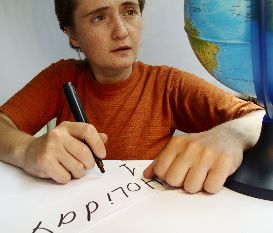Social Anxiety for a Child
Social anxiety for a child is similar to what we, as adults, sometimes feel when we step up to a podium to speak or enter a room filled with strangers. To most of us, a certain amount of anxiety sets in. We’re usually able to cope with it and get by, but children may not have learned those skills as yet.
Sometimes, children are afraid of embarrassing themselves in school by answering a question wrong, getting snubbed by other students or of making a gaffe when having to perform in front of others. They may try to avoid social situations if they have these fears.
Younger children may manifest their social fears by crying or temper tantrums while older children and teens may develop tummy aches, headaches and other imaginary illnesses. This is the child’s attempt to avoid the situation altogether.
Most everyone, especially children, have to cope with shyness at times, but if your child is showing symptoms that are interfering with school performance and keeps him from having fun and interacting with other children, he may have a social phobia that needs to be addressed.
As with other childhood anxiety disorders, you should learn all you can about the problem and figure out a path of treatment. If you suspect that the child might have a social phobia, you should see a pediatrician to get help with diagnosing the severity of the problem.
Many times, you may be able to help your child by working with his school, changing his diet to avoid sugars and caffeine and include exercise in his lifestyle - or pinpoint a reason why your child may be having a social anxiety problem.
For example, your child may have recently been traumatized in school by other kids laughing or making fun of him for something he said or did. If he has a physical problem, such as a speech impairment and perceives himself as different from others, he may feel very subconscious about it and avoid situations where he’d need to speak.
Shyness itself isn’t a social anxiety disorder, but may be a factor in the child developing one as he grows older. Keep an eye on your child’s moods and listen to what he says. Then, you may be able to determine if his anxiety is something he seems to be working through (with your help) or if you need to seek help.
Although social anxiety in children is often a mix of environment and genetic makeup, children can also learn to become anxious about certain situations. That’s why it’s imperative that you, as a parent, learn to cope with your own anxiety issues and set a good role model for the child.
Also, physical configuration can be a factor in anxiety disorders in children. How the brain chemicals emit neurotransmitters can contribute to social anxiety for a child. This can be diagnosed and treated by a doctor.
Consider all of the factors when dealing with social anxiety for a child. Once you have the facts together, you can target the outlying problem and treat it accordingly.
the A to Z directory of dealing with Health Problems & Self Care Strategies for natural remedies to your health issues.

Subscribe to get your weekly "Health Success Magazine" with a new complete & comprehensive Health Report in every edition!

to “Your Health Success”
our weekly F’R’E’E’ Newsletter
If you would like a free no-obligation private consultation or to contact Warren Tattersall for more information, please click here >> Contact Us

Click the books above to learn more about how we treat CFS naturally, to get your life back!
You will find many assorted Health Reports available for download free to you on this website!
Our free Health Success Reports are each available for you to download when you subscribe to receive them and their 7 part eCourse.
You can unsubscribe at any time, but we are sure you will want to receive all the email lessons of these informative ecourses.
Read more HERE to select the REPORT subjects of most interest (or concern) to you.









